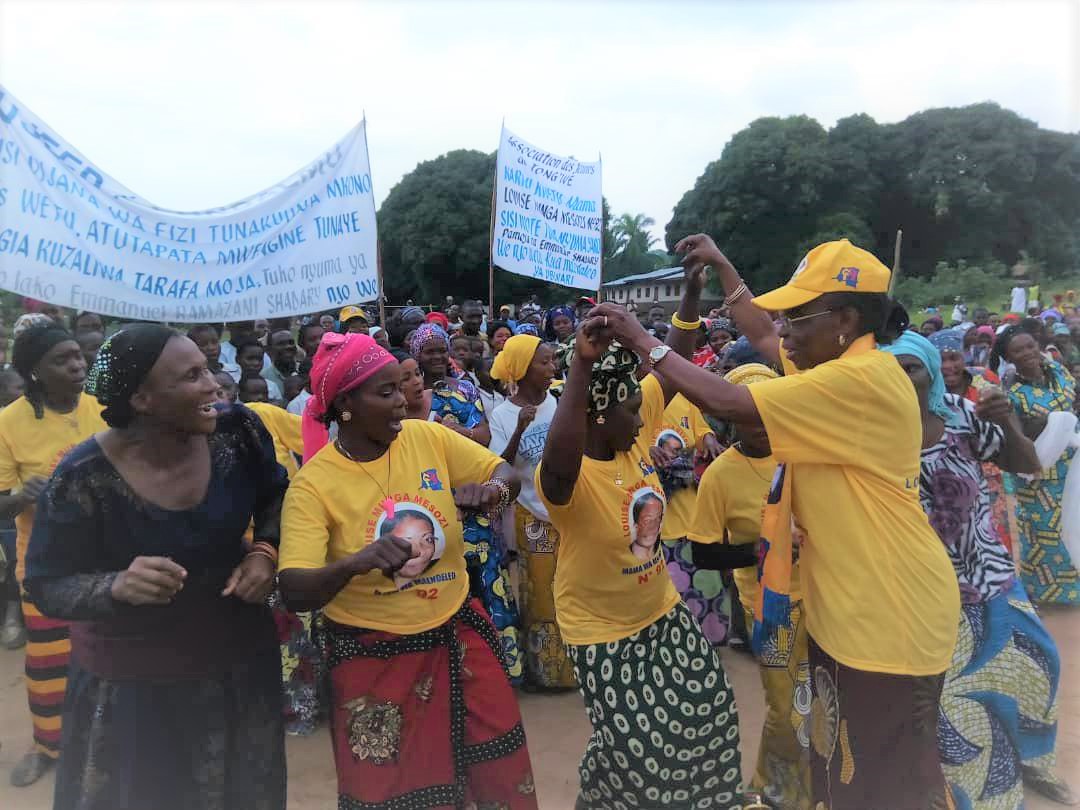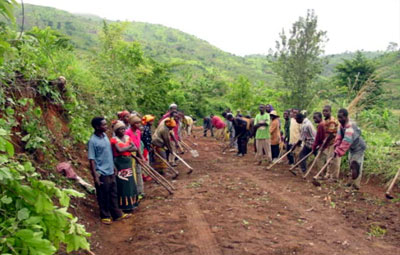|
Lulenge
Lulenge is a Chiefdoms and sectors of the Democratic Republic of the Congo, sector in the Fizi Territory, South Kivu, Democratic Republic of the Congo, Democratic Republic of Congo. Lulenge is located in the vicinity of the Kiloba and Makena villages and has an altitude of 943 meters. Mining and agriculture are the region's most significant revenue-generating and economic sectors. Agricultural co-operatives function much more efficiently in Lulenge, and the Coopérative Business Centre Olive (CBCO) is the largest in the mining sector. The primary agricultural commodities are cassava, peanuts, beans, mushrooms, and rice. Aside from mining and agriculture, fishing is another source of revenue, with Lake Tanganyika situated in the eastern part of the territory. In addition, small enterprises are well-developed in the area. Since 2018, Lulenge has been in the throes of conflicts. The emergence of the Ngumino and Twiganeho militias in November 2021 has escalated tension between Banyam ... [...More Info...] [...Related Items...] OR: [Wikipedia] [Google] [Baidu] |
Mutambala
Mutambala (or M'tambala) is a sector that constitutes one of the four sectors in the Fizi Territory of the South Kivu Province in the eastern part of the Democratic Republic of the Congo. Mutambala is situated near Lake Tanganyika, in the west by the Lulenge sector, in the north by the Tangani'a sector, and in the south by the Ngandja sector. It has a surface area of 777 km 2. The sector consists of five groupings (''groupements''), including the Basimukindja groupings (in the center), the Batombwe groupings (in the south), and the Babwari groupings (in the east). Agriculture is a significant economic activity in the region; it is revenue-generating for farmers. It is geared towards self-sufficiency but also generates profit through SOCODEFI, an agricultural organization that sells cassava to Baraka. Local food crops include cassava, palm oil, rice, maize, beans, banana, tomato, yam, peanut, sweet potato and sugarcane. In addition to agriculture, fishing constit ... [...More Info...] [...Related Items...] OR: [Wikipedia] [Google] [Baidu] |
Chiefdoms And Sectors Of The Democratic Republic Of The Congo
Communes, chiefdoms and sectors of the Democratic Republic of the Congo are the third-level administrative divisions of the Democratic Republic of the Congo. Aketi Territory * Avuru-Duma Chiefdom * Avuru-Gatanga Chiefdom * Bondongola Chiefdom * Mabinza Chiefdom * Mobati-Boyele Chiefdom * Mongwandi Chiefdom * Gbandi Sector * Yoko Sector Ango Territory *Ezo Chiefdom * Mopoy Chiefdom *Ngindo Chiefdom * Sasa Chiefdom Aru Territory * Kakwa Chiefdom * Kaliko-Omi Chiefdom * Zaki Chiefdom Bafwasende Territory * Bafwandaka Sector * Bakumu d'Angumu Sector * Bakundumu Sector * Barumbi-Opienge Sector * Bekeni-Kondolole Sector * Bemili Sector Bagata Territory * Kidzweme Sector * Kwango-Kasai Sector * Kwilu-Ntobere Sector * Manzasay Sector * Wamba-Fatundu Sector Bagira Territory Bambesa Territory * Bakere Chiefdom * Bakete Chiefdom * Bokapo Chiefdom * Bokiba Chiefdom * Bulungwa Chiefdom * Makere Chiefdom *Mange Chiefdom * Mondwangali Chiefdom Banalia Te ... [...More Info...] [...Related Items...] OR: [Wikipedia] [Google] [Baidu] |
Banyamulenge
Banyamulenge, also referred to as nyamurenge and banyamurenge (literally 'those who live in Mulenge') is the name that they adopted in the 80’s describes a Tutsi community in the southern part of Kivu who migrated from Rwanda and seek refuge in the, Democratic Republic of the Congo. The Banyamulenge of South Kivu are culturally and socially distinct from the Tutsi of North Kivu. Most Banyamulenge speak ''Kinyarwanda”, that they mix Kinyarwanda (official language of Rwanda) and some Kirundi (spoken primarily in Burundi) with specific phonological and morphological features found in the two. The ambiguous political and social position of the Banyamulenge has been a point of contention in the province. The Banyamulenge played a key role in tensions during the run-up to the First Congo War in 1996–7 and Second Congo War of 1998–2003. The war in the Democratic Republic of the Congo caused more than 6 million lives, with casualties continuing in North Kivu and South Kivu. In ... [...More Info...] [...Related Items...] OR: [Wikipedia] [Google] [Baidu] |
Tangani'a
Tangani'a is a collectivity located in the Fizi Territory of Sud-Kivu Province, Democratic Republic of the Congo. In the Bembe language (''Kibembe'') Tangani'a means Tanganyika, which is the name of the major lake next to the collectivity. The main town of the Tangani'a collectivity is Mbo' ko located alongside Lake Tanganyika. In this part of Fizi Territory the largest group of the Bembe people are the Banyan'gangya tribe, who are also found in the collectivity of N'gangya, the largest of the 5 collectivities of the Fizi Territory. The main economic activity in Tangani'a is fishing, agriculture and farming. The place is very behind in terms of development due to the isolation of the Fizi Territory since the independence of the Congo. The type of public servants you may find there are primary and secondary teachers, some prosecutors, tax collector A tax collector (also called a taxman) is a person who collects unpaid taxes from other people or corporations. The term could als ... [...More Info...] [...Related Items...] OR: [Wikipedia] [Google] [Baidu] |
Itombwe Mountains
The Itombwe Mountains (or Itombwe Massif, Plateau) are a range of mountains in the South Kivu province of the Democratic Republic of the Congo (DRC). They run along the west shore of the northern part of Lake Tanganyika. They contain a vast area of contiguous montane forest and are home to a rich diversity of wildlife. Geography The Itombwe mountains are a section of the Albertine Rift Mountains, which border the western branch of the East African Rift. These mountains extend from the Rwenzori Mountains in the north to the Marungu highlands in the south. They are made up of uplifted Pre-Cambrian basement rocks overlaid in places by recent volcanic activity. Both of these are caused by the forces that created the Great Rift Valley, where tectonic stresses are causing parts of East Africa to separate from the continent. The highest peak of the Albertine Rift Mountains is further north in the Rwenzori Mountains, at . The highest peak in the Itombwe range is Mount Mohi, at . Several ... [...More Info...] [...Related Items...] OR: [Wikipedia] [Google] [Baidu] |
Buyu Language
Buyu, or Buyi, is a Bantu language of Lake Tanganyika that is closely related to Nyanga. Former ISO coding problems A "Bemba" language of South Kivu was listed in ''Ethnologue'' 17 as ISO code my However, the name, ''Kinyabemba'', is the language of the ''Banyabemba'', one of the tribes that speak Buyu. (It is not the Bemba language The Bemba language, ''ChiBemba'' (also ''Cibemba, Ichibemba, Icibemba'' and ''Chiwemba''), is a Bantu language spoken primarily in north-eastern Zambia by the Bemba people and as a lingua franca by about 18 related ethnic groups. History Be ... of Zambia.) "Songa" goref> is another Buyu-speaking tribe rather than a distinct language. "Buya" yyis unidentified, but may be a typo for Buyu. The codes were retired in 2014. References Nyanga-Buyi languages Languages of the Democratic Republic of the Congo Spurious languages {{Bantu-lang-stub ... [...More Info...] [...Related Items...] OR: [Wikipedia] [Google] [Baidu] |
Belgian Congo
The Belgian Congo (french: Congo belge, ; nl, Belgisch-Congo) was a Belgian colony in Central Africa from 1908 until independence in 1960. The former colony adopted its present name, the Democratic Republic of the Congo (DRC), in 1964. Colonial rule in the Congo began in the late 19th century. King Leopold II of the Belgians attempted to persuade the Belgian government to support colonial expansion around the then-largely unexploited Congo Basin. Their ambivalence resulted in Leopold's establishing a colony himself. With support from a number of Western countries, Leopold achieved international recognition of the Congo Free State in 1885. By the turn of the century, the violence used by Free State officials against indigenous Congolese and a ruthless system of economic exploitation led to intense diplomatic pressure on Belgium to take official control of the country, which it did by creating the Belgian Congo in 1908. Belgian rule in the Congo was based on the "colonial t ... [...More Info...] [...Related Items...] OR: [Wikipedia] [Google] [Baidu] |
Uvira Territory
Uvira Territory is a territory in South Kivu, Democratic Republic of the Congo The Democratic Republic of the Congo (french: République démocratique du Congo (RDC), colloquially "La RDC" ), informally Congo-Kinshasa, DR Congo, the DRC, the DROC, or the Congo, and formerly and also colloquially Zaire, is a country in .... References Populated places in South Kivu Territories of the Democratic Republic of the Congo {{DRCongo-geo-stub ... [...More Info...] [...Related Items...] OR: [Wikipedia] [Google] [Baidu] |
Colonialism
Colonialism is a practice or policy of control by one people or power over other people or areas, often by establishing colonies and generally with the aim of economic dominance. In the process of colonisation, colonisers may impose their religion, language, economics, and other cultural practices. The foreign administrators rule the territory in pursuit of their interests, seeking to benefit from the colonised region's people and resources. It is associated with but distinct from imperialism. Though colonialism has existed since ancient times, the concept is most strongly associated with the European colonial period starting with the 15th century when some European states established colonising empires. At first, European colonising countries followed policies of mercantilism, aiming to strengthen the home-country economy, so agreements usually restricted the colony to trading only with the metropole (mother country). By the mid-19th century, the British Empire gave up ... [...More Info...] [...Related Items...] OR: [Wikipedia] [Google] [Baidu] |
Luba People
The Luba people or Baluba are an ethno-linguistic group indigenous to the south-central region of the Democratic Republic of the Congo. The majority of them live in this country, residing mainly in Katanga, Kasai and Maniema. The Baluba Tribe consist of many sub-groups or clans who speak various dialects of Luba (e.g. Kiluba, Tshiluba) and other languages, such as Swahili. The Baluba developed a society and culture by about the 400s CE, later developing a well-organised community in the Upemba Depression known as the Baluba in Katanga confederation. Luba society consisted of miners, smiths, woodworkers, potters, crafters, and people of various other professions. Kingdoms of the Savanna: The Luba and Lunda Empires Alexander Ives Bortolot (2003), Department of Art History and Archaeology, Columb ... [...More Info...] [...Related Items...] OR: [Wikipedia] [Google] [Baidu] |
Matrilineality
Matrilineality is the tracing of kinship through the female line. It may also correlate with a social system in which each person is identified with their matriline – their mother's lineage – and which can involve the inheritance of property and/or titles. A matriline is a line of descent from a female ancestor to a descendant (of either sex) in which the individuals in all intervening generations are mothersin other words, a "mother line". In a matrilineal descent system, an individual is considered to belong to the same descent group as their mother. This ancient matrilineal descent pattern is in contrast to the currently more popular pattern of patrilineal descent from which a family name is usually derived. The ''matriline'' of historical nobility was also called their enatic or uterine ancestry, corresponding to the patrilineal or "agnatic" ancestry. Early human kinship In the late 19th century, almost all prehistorians and anthropologists believed, ... [...More Info...] [...Related Items...] OR: [Wikipedia] [Google] [Baidu] |





